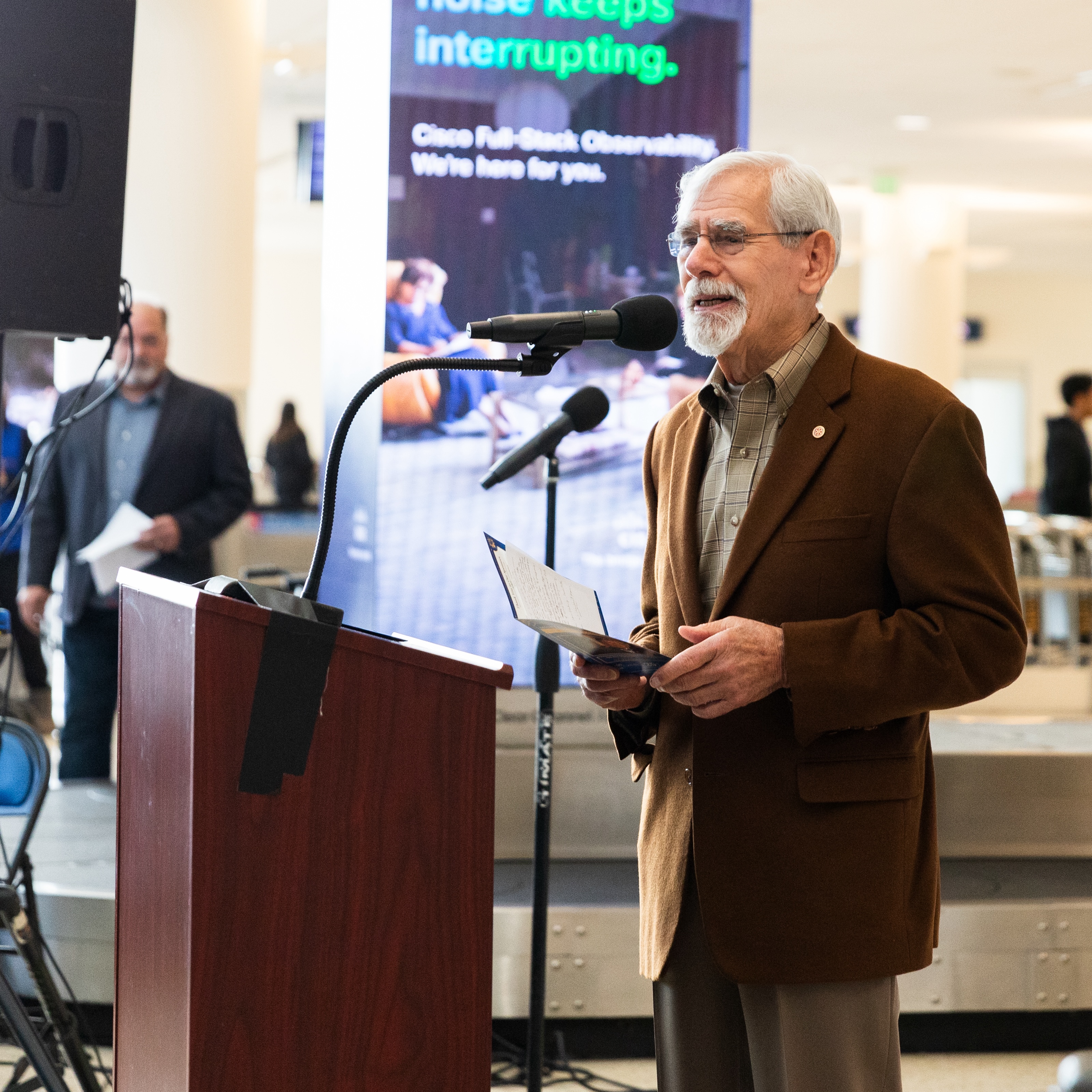|
|
| |
To ensure the efficient movement of people and products, we must prepare a new cohort of transportation professionals who are ready to lead a diverse, inclusive, and equitable transportation industry. To that end, MTI is proud to announce its 32nd Annual Banquet and Convocation Celebration at San José State University on June 29, 2024. We welcome our esteemed trustees, generous sponsors, local leaders, graduates, friends and family to gather and commemorate the advancements made in our industry.
Join our distinguished Board of Trustees as we celebrate our 2024 MSTM graduates, alumni of the year, the winners of the Garrett Morgan Sustainable Transportation Competition, and much more.
|
| |
|
|
| |
|
Introducing the Commencement Speaker
|
| |
|
| |
 Jannet Walker-Ford is a nationally recognized transportation industry executive with WSP USA, a leading engineering and professional services consultancy. A tireless advocate for equity in transportation and the power of public transit to transform communities, Walker-Ford has more than two decades of diverse expertise including management consulting, technology, mobility, and transportation systems. With a focus on equity, sustainability and community building she has served in executive leadership and strategic advisor roles on ground-breaking programs and projects for large transit and transportation agencies across the U.S. She regularly draws on her two decades of experience for national consultancy firms and as the Deputy General Manager/Deputy CEO and CIO at the Metropolitan Atlanta Rapid Transit Authority.
Recognized by Railway Age as a 2023 Woman-in-Rail, she serves on multiple national boards including the current Chair of WTS International and the APTA Executive Committee and has received numerous awards recognizing her success and advocacy including the 2022 American Public Transportation Association’s Business Member of the Year; 2021 WTS Northeast Florida Woman of the Year, 2019 Women of Color STEM Technology All-Star Award; and a 2019 Conference of Minority Transportation Officials’ Women Who Move the Nation honoree. |
| |
|
Thank You for Supporting
Our Education Program!
|
| |
|
| |
|
|
| |
THANK YOU to AC Transit, AFL-CIO Transportation Trades Department, Alstom, Altamont Corridor Express ( ACE), American Public Transportation Association ( APTA), Association of American Railroads ( AAR), Bay Area Rapid Transit ( BART), California Strategies, Conference of Minority Transportation Officials ( COMTO), Contra Costa Transportation Authority ( CCTA), Cubic, Econolite, Fortino Winery, HNTB, InfraStrategies, Latinos in Transit, Lea+Elliott, SamTrans, San Jose Department of Transportation, Santa Clara Valley Transportation Authority ( VTA), SYSTRA USA, Tri Delta Transit, United Airlines, and WMH Corporation, for supporting the MTI Student Fellowship Fund! Your generous contributions will support the next generation of transportation leaders.
|
| |
|
| |
Retired Founding Executive Director
|
| |
|
| |
 Congratulations to MTI’s Retired Founding Executive Director Rod Diridon, Sr. who was honored with a Doctor of Letters from SJSU this month! Diridon served as founding executive director of the Mineta Transportation Institute until 2014 when he moved to Emeritus status. He has chaired more than 100 international, national, state and local programs, most related to transit and the environment. He regularly provides legislative testimony on sustainable transportation issues and is regarded by many as the “father” of modern transit service in Silicon Valley. Originally graduating from SJSU in ‘62 with an undergraduate degree in Accounting and in ‘64 with an MBA, Diridon is being deservedly recognized with this honorary degree for embodying the Spartan spirit and for being a catalyst for positive change in our community. Thank you, Rod Diridon, for all you do for transportation and SJSU! |
| |
|
| |
 Congratulations to MTI’s own Student Assistant Rosa Bucio Arciga! Rosa recently completed SJSU's Leadership and Career Certificate Program and has been selected as the recipient of the Lucas College Carolyn B. Hayes Business Scholarship for Fall 2024 in the amount of $2,000.00! Rosa is currently pursuing a BS at SJSU in Business Administration Management with a minor in Justice Studies. A first-generation college student, Rosa uses her top-notch organizational skills to support important events like the MTI Annual Banquet and the Mineta Summer Transportation Institute. Bilingual in Spanish, Rosa also supports MTI’s translation efforts for event flyers and workforce development materials. Rosa describes her motivation for completing the certificate program as stemming from her desire to develop into a more effective leader for the benefit of her community and to strengthen her professional capabilities. Rosa said of her plans, “I'm researching how to apply to law school or business graduate school. I also spend time volunteering at my son's school and advocating for the opportunities MTI provides for the younger generations.” Congratulations again, Rosa! |
| |
|
| |
|
|
| |
Exploring Equity Frameworks for a Cross-Jurisdictional Vehicle Miles Traveled Mitigation Program in Santa Clara County
The Santa Clara Valley Transportation Authority (VTA) partnered with a Mineta Transportation Institute (MTI) research team and San José State University (SJSU) students for assistance in developing the equity framework for the agency’s proposed Equitable Vehicle Miles Traveled (VMT) Mitigation Program. The goal of the program is to reduce the amount of driving generated from new developments in Santa Clara County through transportation solutions with equity and cross-jurisdictional collaboration in mind. This report summarizes and builds upon student contributions to present a set of equity-focused recommendations for VTA to consider for program development, implementation, and evaluation. Notable strategies identified for developing the framework include defining VMT equity with local relevance, creating an accountability plan, and embedding equity into key decision-making points. Additionally, a transportation challenge frequently mentioned by stakeholders was a need for improved transit availability, frequency, reliability, and speed. Major recommendations discussed in the report include developing and adopting a localized definition of VMT equity, developing an informative and implementable accountability plan, embedding equity measures into project prioritization and evaluation processes, and prioritizing improvements to public transit.
|
| |
|
|
| |
|
|
|
| |
Is There a Light at the End of the Tunnel? The Outlook for Cybersecurity Insurance and Transit in 2024
MTI's latest white paper reviews the most recent changes in the cyber risk landscape to public transit agencies, the responses by the insurance market and the transit agencies to these changes, and provides recommendations for how the different segments of the market can work together to manage the risk of cyber attacks. Cybersecurity threats are everywhere, and no business is immune. While the volume of cyberattacks has increased exponentially, the bigger concern for most transit agencies is that the number of successful attacks and the average cost to recover from them has increased as well. Many transit operators have taken steps to shore up their cyber resiliency while others continue to assume that they will not be targeted. Insurance companies have limited coverage, adjusted the cost of coverage, tightened underwriting, and even exited the market. Regulators have responded with increased education, resources, and the imposition of basic cybersecurity requirements.
|
| |
|
|
| |
|
|
|
| |
What Do Americans Think About Federal Tax Options to Support Transportation? Results from Year Fifteen of a National Survey
MTI has released the results from its 15th annual survey in a series that explores public support for raising transportation revenue through higher federal gas taxes or a new mileage fee. A majority of respondents (51%) supported replacing the federal gas tax with a mileage fee where the rate would vary according to the vehicle’s pollution emissions.
Other key findings include that large majorities supported transportation improvements across modes and wanted to see the federal government work towards making the transportation system well maintained, safe, and equitable, as well as to reduce the system’s impact on climate change. Findings related to gas taxes include that only 2% of respondents knew that the federal gas tax rate had not been raised in more than 20 years, and 74% of respondents supported increasing the federal gas tax by 10 cents per gallon if the revenue would be dedicated to maintenance. With respect to mileage fees, several options tested received support from more than half of respondents. Also, the majority of respondents supported variable mileage fee rate structure options; 62% preferred charging low-income drivers a reduced mileage fee rate, and 52% preferred charging electric vehicles at a lower rate than gas and diesel vehicles.
The analysis of trends across the survey series, which has run annually from 2010 to 2024, shows that support for both higher gas taxes and a hypothetical new mileage fee has risen slowly but steadily.
|
| |
|
|
| |
|
Cycling Past 50: A Closer Look into
the World of Older Cyclists, Year 5 Survey
|
| |
|
| |
|
|
| |
First offered in 2018, the 50+ Cycling Survey gathers information about the cycling history, habits, and preferences of older adults. Now in its fifth year, the survey runs through January 2025. The online journal is ongoing.
MTI became a partner in the survey by publishing the Year 3 report. MTI’s partnership includes promoting the survey, providing staff support for its content and data analysis, and publishing each year’s report.
The survey increases our growing understanding of older cyclists in order to affect policy, programs, design, and practice. The Year 4 survey report, Cycling Past 50: A Closer Look into the World of Older Cyclists (December 2023), shares responses from about 5,000 cyclists ages 50 to 85-plus, answering questions such as who is cycling, when do they cycle and where, how far do they go, and how often. Further analyses can address fundamental questions about how to keep cycling in people’s lives as they age, such as:
- How does the role cycling play in their life course affect the amount of cycling an older adult does and how long they expect to continue cycling?
- How can the effects of the aging process be mitigated to support cycling as people age into their 70s, 80s, and even 90s?
- What is important for people when they cycle? What do they want from cycling?
- What infrastructure design and operation benefits older cyclists?
More information is available at dblTildeCORE.org.
|
| |
|
|
| |
|
|
|
| |
Pedaling Progress: Equity Assessment of San José's Urban Bike Infrastructure via SJ-BikeEquity Tool
Bike networks are growing nationwide—including in San José, which is keen on becoming “one of the most bike-friendly cities in North America.” Expanding bike networks and allocating funds require careful planning to ensure a fair distribution of bike infrastructure, but most assessment methods neglect differences in bike path classes that provide different safety and comfort levels for cyclists. MTI experts discussed an equity assessment of San José’s bike infrastructure, driven by a weighting system for different safety and comfort levels of the urban bike network, and what it could mean for traffic congestion, sustainability, and Bay Area communities.
|
| |
|
|
|
|
|
|
| |
Beyond the Pump: Rethinking Transportation Funding Without the Fuel Tax
While the climate benefits from booming electric vehicle sales, the nation’s transportation system faces an unfortunate predicament: less gasoline and diesel purchased means dwindling fuel tax revenue. Fuel tax revenue provides a core funding source for operating, maintaining, and improving transportation systems, so policymakers must find a replacement as soon as possible. This event explored such options as mileage fees, higher annual vehicle fees, or abandoning the user-pay principle and relying on general fund revenue.
|
| |
|
|
|
| |
|
|
|
| |
Collaborative Strategies for Sustainable Transportation: Developing an Equitable VMT Mitigation Program for Santa Clara County
New developments are popping up everywhere, and bringing more economic opportunities, more community engagement, more trips to new and exciting places—and more driving. The Santa Clara Valley Transportation Authority (VTA) is working with partners to develop a program to reduce the amount of driving generated from new developments, and they called on a team from the Mineta Transportation Institute (MTI) and San José State University (SJSU) students for help. This collaboration provided assistance in creating an equity framework for VTA’s proposed Equitable Vehicle Miles Traveled Mitigation Program. During the event, attendees heard from the researchers about identified strategies for equitable VMT mitigation programs and effective community engagement processes and how they can be applied to other jurisdictions.
|
| |
|
|
|
|
|
|
| |
Emergency Preparedness in Motion: The Role of ICS in Transportation
If a wildfire, earthquake, or cyber emergency impacts a transit system—what happens next? How do transportation agencies respond in an emergency? The use of an Incident Command System (ICS) allows for a uniform response method for emergencies and is required by FEMA and the FHWA. ICS, however, is rarely used by transportation personnel. Transportation and emergency response experts discussed the pros and cons of implementing ICS training for field-level transportation supervisors and staff.
|
| |
|
|
|
| |
|
|
|